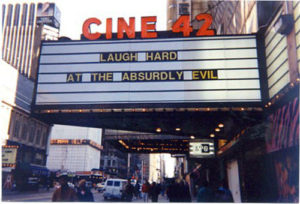No, really – this has become one of the must-reads of the year, every year since its inception back in 2000, not merely for the digiterati, but for anyone interested in (profoundly wary, but also) ferociously erudite, blessedly troll-free discussions of technology, current events and social megatrends as they affect, inspire and decimate this, the endlessly doomed/furiously hopeful human experiment.
“This,” of course, is the annual, two-week State of the World chat/dialogue/confab/e-forum thing, underway right now between sci-fi superhero and esteemed futurist Bruce Sterling, and his longtime colleague, the activist/consultant Jon Lebkoswky (along with sundry civilian contributors), all hosted by the Internet’s most enduring elder statesman of community forums, The WELL.
(Fun fact: SFGate was originally envisioned and established by one of the WELL’s first managers, John “Tex” Coate, back in 1998).
Sterling, for the uninitiated, is no mere nerd. He’s a renowned, award-winning cyberpunk author, speaker (his closing remarks at last year’s SXSW Interactive became instantly legendary), world traveler, meta-geek and intellectual soothsayer, a uniquely keen observer of the world whose deft, seemingly effortless encapsulations of global events and social upheavals are both insightful and enormously addictive, largely due to a gracious-but-fearless tone, but – perhaps more importantly – for his general refusal to declare what he observes as either good or bad, black or white, red or blue. As Sterling himself puts it in one of this year’s opening posts:
I just don’t do “positive” and “negative”. I actively avoid that kind of value judgment. Wishful thinking and fearful thinking gets in the way of an objective understanding of change-drivers. Change occurs from pent-up energies: it’s like asking if a battery’s voltage is “good” or “bad.” All potential change has positive or negative potential: otherwise it isn’t even “potential.”
Is there really such thing as “an objective understanding of change-drivers,” independent of the observer’s race, color, worldview? I’m not so sure. But when the discourse is this refreshing, I don’t much care. A razor-sharp, globe-trotting, tech-savvy thinker who resists egomaniacal opinioneering in favor of (deeply jaded, but hey) curiosity about possible outcomes, directions, social tilts, bouncing his thoughts off other like minds? It’s like finding an oasis in a sandstorm. Or a complete sentence at a Trump rally.
And Sterling’s comrade, Jon Lebkowsky, acts as a sort of interlocutor/moderator, steering the conversation hither and yon and offering thoughtful counterpoint to Sterling’s views – which, by the way, are vast and far-reaching, from climate change to AI, global tech hegemony to a roll-call of various nations’ plights and innovations. It’s one part dialogue, one part socio-technological treatise, one part wide-angle stream of consciousness, and all parts wonderful. I probably glean more from this chat – which I usually re-read multiple times – than from six months of The Economist, Wired and Forbes, combined.
It’s also fantastically low tech. Posts appear as they always have in the WELL, since way back in 1985: as a series of barely formatted, asynchronous blocks of text (hi, Courier!). Also: No ads. No trolls. No glamorous (but totally needless) “Snowfall” graphical layouts. No interstitial pop-up videos or infuriating overlays demanding you “Sign up for our newsletter!”
Just beautiful minds at work, reminding you not only that that engaging, respectful contemplation still exists in the world, but that it can still nourish like little else. Dive in.
Read more here:: The smartest thing you’ll read this year


